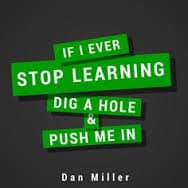
I’m a sucker for self-help books.
In my decade as a bookseller and a half century as an avid reader, I’ve learned there are some that help and scads that don’t.
Happiness books form a big slice of the self-help pie. I didn’t make a list of books to read that will make you happy. I wrote about building a reading life that generates a happier you.
So how can you read your way to a happier life?
The critical element is to choose books that will grow your gratitude, renew your mind, serve as bibliotherapy, collect dopamine hits, solve your problems, make relational connections, help you regain perspective and learn from thought leaders.
What you read impacts your thoughts and mindset.
Grow Your Gratitude
Nothing impacts happiness like becoming more grateful.
Develop an attitude of gratitude by reading about spiritual or patriotic heroes.
Reading about the lives of true heroes can boost your gratitude quotient. You become grateful for your own life and grateful for the ones who sacrificed for your benefit.
As an added bonus, you can borrow courage from their stories and insight on how to live yours better.
Memoirs and biographies can inspire us.
We are infused with courage by reading their stories. I remember when I was in difficult situations thinking that if Corrie Ten Boom could survive the concentration camp, I could survive, too. My situation was not nearly as bad as hers.
Even fiction can inspire. When we relate to a character, hero or person, we can vicariously feel their emotions and celebrate their victories with them. That gives us hope to face our foes, to climb our mountains and win our battles.
It’s possible to live without a lot of things, but hope is essential. Getting the inside story about people winning helps us believe we can win, too and the future will be better than the present.
Renew Your Mind
Create your own upward spiral by focusing on hope and inspiration.
The Bible encourages us to renew our minds. How do you do that, exactly? Meditation on inspirational passages, sure. Filling our minds with music that uplifts.
But, another, critical strategy is to direct your thoughts by choosing reading materials that uplift.
Direct your thoughts by carefully choosing your reading material.
News cycles prey on fear.
Social media preys on envy.
Our lives are dominated by sound bites and memes.
But, the hard work of challenging values, attitudes and beliefs takes more than 90 second quips.
When you choose to read uplifting books you choose to think uplifting thoughts.
A more directive way your reading can improve your mental health is to read self-help books related to whatever issue you wrestle with currently.
The great news is, it’s easier than ever to build your book stack with uplifting, inspiring books. Fill your night stand and end tables with those stacks, discipline your self to limit media junk food and consume the thoughts that will renew your mind.

Regain Perspective
So much of happiness has to do with perspective. Daily frustrations and daily challenges grind away at peace and joy. Conflicts, tensions, stress, hurry, stagnation and boredom can all eat away at our happiness stash.
Stepping back to see the big picture is often the dose of reality that we need.
Meditating on timeless principles helps us gain perspective.
So does learning about real people who overcame real obstacles.
Memoir can do it. So can non-fiction books about faith and spirituality.
Even a well-told fictional story can help us realign our lives around the foundational beliefs that drive us.
People winning battles in a different era helps us see our place in the timeline of history.
When you’ve lost perspective, the right book can help you get it back.
William Nicholson said, “We read to know we’re not alone.” There’s something encouraging about knowing that others have survived what you’re going through. They know how you feel. They found hope and persevered.
One way to combat depression is to regain perspective. A great way to step back and get a panoramic view is to crawl into someone else’s skin. See life through their eyes. Realize how much you have to be thankful for and the real size of your problems. See where you fit in to the timeline of world history. Our lives are just a blink. The things we worry and stress about often are not worth the mental energy we spend on them.
Reading about someone else’s reality puts our problems into perspective. Seeing them overcome problems gives us hope.
David McCullough said, “You read nonfiction to learn the truth about history. You read literature to learn the truth about human nature.”
Solve Your Problems
Attack your problems by tapping into the experts who have answers to what you’re facing.
What’s keeping you from being happier? The problems in your life.
It could be health, money, relationships, advancing your career, looking for purpose or developing your beliefs.
Anything can benefit by seeking out experts for insight into your struggles.
You might be starting with symptoms. Not a problem. A good diagnosis is the first step and it might not be an easy one. There might be some hit and miss, some seek and find involved. That’s okay.
Maybe you’re even starting with a vague uneasiness or an impression that something is wrong. That’s not a bad place to start, either. Sometimes diving into research will help you unearth and even give a name to what you’re dealing with.
I always find a sense of relief when I discover something that has a name. That means that I’m not the only one and that there’s hope for recourse, just because it has a name.
It’s happened to me with “phone phobia” and “the frozen grief of ambiguous loss”. Both a giant exhale just finding it had a name.
So, start where you are and dig around.
There will be conflicting theories and opinions. Different approaches and different voices with advice. Check them out. Evaluate them against your current knowledge and beliefs. Try them on. Try them out. Embrace the ones that align and ditch the ones that don’t.
Now you have a game plan, a map or, at least a starting block.
All these benefits by researching and reading up on your problem.

Make Relational Connections
Read to children to strengthen bonds, create memories and develop their intelligence.
I admit, one of the greatest joys of my life is reading to children.
I loved reading to my kids and now I love reading to my grandkids.
There’s few things more satisfying than clean, damp munchkins in footie pajamas snuggled in with a fuzzy blanket to hear a story.
That alone increases my happiness quotient.
Better than that, it increases theirs as well.
There’s a similar dynamic when you join a book club, whether it’s in person or virtual.
Read aloud or listen to audio books on road trips to make the miles go faster.
Yes, you have to some research to find books that everyone in the car will enjoy. It might take a few false starts. But, stick with it till you hit the jackpot.
Sarah Mackenzie of The Read Aloud Revival nails it when she says that reading aloud makes lasting and meaningful connections with your kids through books.
In the same way that watching movies together builds common memories and inside jokes, listening to stories aloud together creates those same bonds.
Apply Bibliotherapy
Let me be clear. I’m referring bibliotherapy in it’s most general term. While doing research for this post, I found articles on professional bibliotherapy as a treatment for anxiety, depression and other afflictions. It’s fascinating how trained therapists are using directed reading to improve people’s mental health.
What I’m talking about here is self-directed bibiotherapy, that is to say choosing your own books and reading to make life better.
There are many well-known benefits of reading. Reading lowers stress by reducing your heart rate and releasing muscle tension starting in as little as six minutes.
It’s well-known that reading expands your vocabulary, increases your knowledge and can help you have more empathy for others.
Toss in the advantages of taking a mini-vacation. Reading has a lot going for it.
But, there’s some benefits that might not be so obvious. Maybe even surprising.
Nine Surprising Benefits of Bibliotherapy
Become your own bibliotherapist and build your book stack to impact your emotional health.
Collect Dopamine Hits
Dopamine is a feel good chemical that occurs naturally in the body, but there are ways to stimulate the production of dopamine.
Learning new things is one way.
A study from UC Berkley showed that your brain receives dopamine hits when you learn new information. If you read to learn, your body will reward you chemically.
Learning new things can literally make you feel better. Who hasn’t had a eureka moment that got them excited? Why not put yourself in a position to learn on a regular basis?
Read to learn. It’s good for your happiness.
Learn From Thought Leaders
Thought leaders write books.
So do the experts in your field.
To understand current trends, read what they are writing. Find the strengths and the fallacies.
Don’t trust hearsay. Get it straight from the horse’s mouth to make an accurate evaluation.
Then join the conversation.


